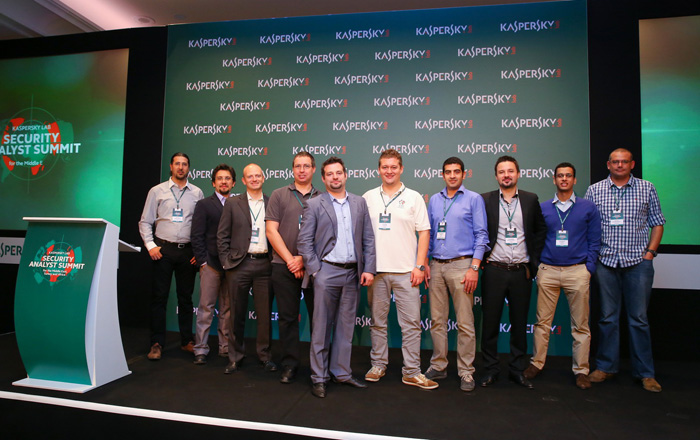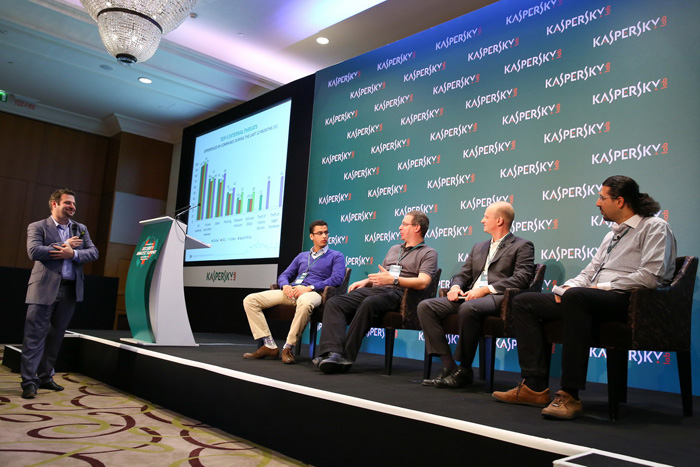Kaspersky Lab presents META region threat landscape overview and its recent Enterprise strategy
On April 20-24 within Kaspersky Lab Security Analyst Summit for the Middle East, Turkey and Africa held in Budapest, Hungary, Kaspersky Lab’s Global Research and Analysis Team (GReAT) specialists and invited IT-security experts met with the leading media in the region and discussed global and regional cyber threats, corporate security issues and solutions to them.
As cyber threats increase and become more complicated each year, Kaspersky Lab is paying special attention to sharing expertise. During the Kaspersky Lab Security Analyst Summit for the Middle East, Turkey and Africa held on April 20-24, specialists from the company’s Global Research and Analysis Team (GReAT) joined other guest experts in Budapest, Hungary. They discussed and presented to the leading media in the region global and local cyber threats, corporate security issues and potential solutions to these problems. The company also presented its new virtualization and fraud prevention solutions, among other technologies, demonstrating the growing strength of Kaspersky Lab’s enterprise security portfolio.
The summit assembled a host of IT-security experts: Necati Ersen Siseci from the Scientific and Technological Research Council of Turkey (TUBITAK) Cyber Security Institute; Paolo Borghesi from Deloitte & Touche in Qatar; Boldizsar Bencsath from Laboratory of Cryptography and Systems Security of Budapest University of Technology and Economics; and a number of Kaspersky Lab representatives.
“Today cybercrime is reaching across geographical boundaries and has become a major global problem affecting almost every country in the world,” said Maxim Frolov, Head of Business Operations, Emerging Markets, Kaspersky Lab. “However, each region has its own specific features. As a global international company Kaspersky Lab has a wide-angle view of the modern IT security landscape and we are glad to share it with anyone who wants to know which cyber threats are out there and how to protect personal and business assets. We hope that the Kaspersky Lab Security Analyst Summit for the Middle East, Turkey and Africa is a further step on to the path towards cyber safety.”
Sergey Novikov, Deputy Director of GReAT, discussed threat evolution in the META region. Last year Kaspersky Lab’s products neutralized more than 132 million cyber-attacks and infections on PCs and mobile devices in the Middle East, 41.5 million in Turkey and 214 million in Africa –about 50% more than 2012’s figures. Company statistics also indicate that an average of 32.7% of users in the region faced web-related threats and 47.24% of users had security incidents related to local networks and removable media.
Stefan Tanase, Senior Security Researcher in GReAT, presented an analysis of the world of cyber-warfare and advanced persistent threats. He talked through some recent cyber-espionage campaigns and offered predictions for the future. Against a backdrop of small cyber-mercenary groups and the ever-decreasing cost of sophisticated cyber-campaigns and supply chain attacks, Stefan stressed the importance of understanding that no high profile entity or enterprise can feel totally safe nowadays.
A special presentation was dedicated to securing online and mobile financial transactions. The Head of Technology Positioning Department Vladimir Zapolyansky showcased vulnerabilities in modern electronic payment systems and e-commerce sites. He gave examples of real-life cases and explained how the recently-unveiled Kaspersky Fraud Prevention platform helps combat cyber-attacks targeted at financial service providers and users.
A plenary session discussed various global and regional corporate cybersecurity issues. Among the topics were coping with Distributed Denials of Service, securing the data storage, personal devices and clouds used by employees at work (BYOD and BYOC trends), employee attitudes towards security policies, and the need for government regulations of business standards.
During the summit, enterprise threats were a recurring topic. In response to this Vladimir Zapolyansky gave examples of how a number of cyber incidents could have been eliminated using existing security tools. Within his presentation he paid special attention to the recent expansion of the company’s enterprise portfolio - Kaspersky Security for Virtualization | Light Agent solution for Microsoft Hyper-V, Citrix XenServer and VMware customers and its availability in the region. This updated solution now offers virtual endpoints security that had previously been difficult to offer without sacrificing network performance. The new virtualization light agent technology, along with the flagship Kaspersky Endpoint Security for Business, Kaspersky Fraud Prevention and other security products, forms a comprehensive platform of enterprise solutions that makes it more efficient and easier to manage security for all customers.
Kaspersky Lab presents META region threat landscape overview and its recent Enterprise strategy
Kaspersky
Related Articles Events Calendar
Kaspersky Lab Enhances its Office in the Middle East
Kaspersky Lab, a leading developer of secure content and threat management solutions, has appointed Ghassan Darri as its new Managing Director for the Middle East Region, and strengthened the local leadership team responsible for development in the Enterprise sector.Read More >Kaspersky Lab and Mensa help you train your alertness in Global Think Test
Kaspersky Lab and Mensa are inviting Internet users to a very special challenge over the summer. The Global Think Test is made up of a series of online brain games and meant to challenge the combination and calculation skills of participants.Read More >Kaspersky Lab’s Latin American Security Analyst Summit Explores Security and Privacy in a Hyper-connected World
On August 17-20, 2014, Kaspersky Lab held its fourth annual Latin American Security Analyst Summit in Cartagena, Colombia, to present and discuss the Latin American threat landscape and the latest analysis of cybercrime and security trends from around the world to journalists from 12 countries throughout the region.Read More >

